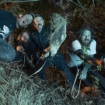For Gojira diehards, Revolver has two limited-edition Spring Issue bundles featuring a numbered slipcase, alternate cover and either an exclusive Mario Duplantier art print or the band's new album, Fortitude, on CD and vinyl. Get yours before they're gone!
For the Gojira cover story of our new Spring Issue, we knew we had to do something special. So, we enlisted Code Orange ringleader Jami Morgan to do the honors interviewing Gojira frontman Joe Duplantier. The two are label mates on Roadrunner Records and have also toured together, so they have a strong rapport — despite the fact that Morgan's brash, rough-edged demeanor and Duplantier's chill, reserved vibe couldn't be more different. In fact, their conversation was so free-flowing that a lot of compelling material ended up on the cutting-room floor. Thanks to the internet, it's not completely lost, however, and in the lead-up to the April 30th release of Gojira's new album, Fortitude, we're posting "outtakes" that didn't make print. Up today, Morgan and Duplantier discuss the challenges that face modern metal bands and what keeps them going against all odds.
JAMI MORGAN All right Joe, it's me and it's you. And imagine we're backstage. Imagine we're backstage at some fucking venue and you want to get out of the room but you can't now … No, really, I'm going to say actually a lot of nice stuff to you for the first time ever. So, it's going to be wonderful.
JOE DUPLANTIER [Laughs] Holy shit. I'm excited. Bring it.
MORGAN There we go. … I wanted to start off by the main thing I always wonder about, which I've talked to you about a little bit but ... being a modern metal band, as we would call it ... We're both in modern metal bands, right?
DUPLANTIER Right.
MORGAN You guys, to us, are by far the most inspiring in terms of your journey because you've had to take a trajectory that is not really comparable to the bands that you and I listen to or tour with, like, opening up with. And you talk to them, whether it's ... You guys have obviously toured with Metallica. Or whether it's when we toured with Anthrax or Slipknot. You know, some of the best bands ever. Their records came out. The shit hit. It went boom, boom, boom, and the journey began. And they were pretty much where they're at now. I'm not saying that there wasn't a couple years there, but it's boom! And for me, that's always been something that's not discouraging, because I love those bands, but I would see that and I would go like, "Shit. We do another album." I'm like, "We're getting farther away from that journey that those bands had." So, to us, looking at you guys, we've always been really inspired by the amount of times and amount of great records you've made that you keep climbing that ladder.
And I know there's not an end game. It's not like, "Oh, we want to take over the world," but you get to more people. More people know who Gojira is. You're now coming into this record in a position where I saw you on the cover of Rolling Stone France or whatever. It's crazy shit that would have been unimaginable at some point, I'm assuming. So, my question is, basically, how did you keep motivation throughout that journey? And at the different stages of that journey, were your goals different?
DUPLANTIER Yeah. I don't know. We were "born" a bit late after the whole music industry was flourishing and all these bands could sell a lot of records and be comfortable in music. The music business was really different back then. When we started, it was the late Nineties but took us 10 years because we came from a small village in the southwest of France. It took us 10 years to just break through these borders. And the closest people we had that were in the business were not necessarily [giving us] good advice. They would tell us, "Yeah, yeah. You should sing in French. And what's up with the death-metal thing? You guys need to do some hip-hop shit." So anyway, people didn't believe we could make it, but we didn't ... I think, for us, the key was that we weren't really after immediate results. We were already blown away to be able to just play together and create that ball of energy that we would play in front of people. It was a very immediate reward for us. We would play a show, people would headbang. Yay! Happy. You know what I mean?
MORGAN Yeah.
DUPLANTIER So for 10 years it was just that, but there was more and more and more people headbanging in front of us, and it was already ... After 10 years we were like, "Hey man, we did something already in France. We're really living the dream because we get to drive our van to a venue and then they open the door and let us play there." It was incredible, just that. So, we kept small goals, little by little. I'm not saying we were never thinking big. Of course, we were dreaming to be the next Metallica, but it was a blurry fantasy.
MORGAN Yeah. [Laughs]
DUPLANTIER But it didn't really resonate with anything that was actually possible to achieve. But I don't know, man. We love music so much that we're always excited to play in front of a larger audience, slightly larger audience for every album. We never lost the faith.
MORGAN Yes. Oh, for sure. And I know from just doing a micro version of what you've done in terms of interviews and stuff, it's hard to verbalize that journey for sure because it just feels like when you've been on a long journey like that, it's just like what you said: It's this small goals thing. But being our band and looking at your band, I don't know if you even realize it but you're setting a beautiful standard for what can be done, because outside of you, there's maybe a couple others you could say ... have culture and credibility and have a real, true sound, that don't feel shaped by the outside world. ... Whether you meant to do that or not, it's like, "This is how you do it." You keep hammering at the wall and eventually the wall falls down. ...
I think maybe for kids reading [this] who are doing bands now, for a lot of them that's the way that it's going to have to be because that's the business that we're in. But when you were writing this record — Magma was clearly the record that, I guess, in a lot of ways, kind of broke you through that wall — and you tell me, but that's probably why you toured so long on it and really kept going on it, because you finally hit that thing and everything you wanted was coming. So, when you're writing this record, does that factor into your mind or are you able to drown that noise out — like, you and Mario [Duplantier, Gojira's drummer and Joe's brother] and the boys?
Are you able to just focus on each song, or ... Because I've noticed, for me, I'm doing that 100 percent. I'm focused on the art and the songs, but then there is that drip of, when you're really honest with yourself ... For me, when I'm not trying to play pretend, there's that drip of, "Is what we're doing better? Is what we're doing going to help us?" And it's hard to block out. So, I was just wondering if that seeps into your mind and how you deal with that.
DUPLANTIER Yeah. I'm definitely aware of that pressure. I try to ignore it. I try to go to the studio thinking we need to have fun. We need to create something that we enjoy. And that this is always the direction that we're taking. But of course, yeah, I know exactly what you're talking about. It's becoming our lifestyle, our entire life. Being on the road. We go through so many different things that people don't necessarily realize or they [think] pretty much, "Yeah, they're on a tour bus. They're having fun, drinking a beer."
MORGAN Yeah.
DUPLANTIER But it's hard. It's fucking hard, man. When you sacrifice so much for your passion and for your love of music and love of performing and sharing with people. It's beautiful what we're doing, but it's hard. It's so, so, so, so hard. So, of course, when it's time to make a new album and you know that this album could be a game-changer and put you in a bigger bunk and put your ass in a hotel sometimes and headlining festivals and good food and all that stuff. Yeah. It's there. Of course, it's there — I'm not going to lie. But luckily our tendencies, where we want to go now musically, fits with, also, that reality. And I think by playing shows, when we play a riff where people can connect and sing along, it's also incredibly rewarding so you want more of that, too, just because of the feeling it gives you. And we were lucky to ... a lot of people gave us shots.
Bands took us on tour when we were really death metal. Metallica took us on tour. The first time we didn't have any single out or anything. So, it was putting us on the stage: "Here, death-metal turds. Show what you can do in front of a crowd that wants major fucking hits and legendary bands and stuff." So, we got that opportunity to test our material in front of audiences like that. And I think, without thinking about it, it probably shaped our sound a little bit. So somehow, it's related to what you're mentioning, I think. It's present in our subconscious, and sometimes we're conscious of it, too. When we write a killer riff, what do we say? "People are going to dig that shit!"








